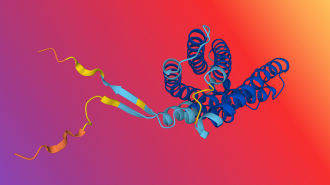The discovery of an “anxiety gene” — and a natural way to turn it off — in the brains of mice could lead to new treatments for anxiety disorders, which are the most common type of mental illness in the world.
The challenge: While anyone can experience worry or dread, people with anxiety disorders experience those feelings pervasively and often for no identifiable reason.
Medications can relieve the symptoms of anxiety, but because we don’t really know what is going on in the brains of people with anxiety, finding the right drug or combination of drugs can be a time-consuming process of trial and error.
The suppression of the gene appeared to provide stress relief and reduce anxiety-related behavior.
The anxiety gene: To understand what is happening in the brain to cause anxiety, a UK-led team of researchers restrained mice for 6 hours to induce a stress response and then analyzed the rodents’ brains on a molecular level.
This led to the discovery of increased levels of five microRNAs (miRNAs) — small molecules that help determine which genes in a cell are expressed and which aren’t — in the amygdala, the brain region implicated in anxiety.
When the researchers took a closer look at the miRNA that reached the highest levels, miR-483-5p, they saw that it suppressed the expression of the Pgap2 gene — and that this suppression appeared to provide stress relief and reduce anxiety-related behavior.
“miRNAs are strategically poised to control complex neuropsychiatric conditions such as anxiety,” said co-lead author Valentina Mosienko. “But the molecular and cellular mechanisms they use to regulate stress resilience and susceptibility were until now, largely unknown.”
“The miR483-5p/Pgap2 pathway … offers a huge potential for the development of anti-anxiety therapies.”
Valentina Mosienko
Looking ahead: If further research validates the finding in human brains, the discovery of this anxiety gene — and a natural way to put the brakes on it — could serve as a blueprint for treatments to help people with anxiety disorders.
“The miR483-5p/Pgap2 pathway we identified in this study, activation of which exerts anxiety-reducing effects, offers a huge potential for the development of anti-anxiety therapies for complex psychiatric conditions in humans,” said Mosienko.
We’d love to hear from you! If you have a comment about this article or if you have a tip for a future Freethink story, please email us at tips@freethink.com.
